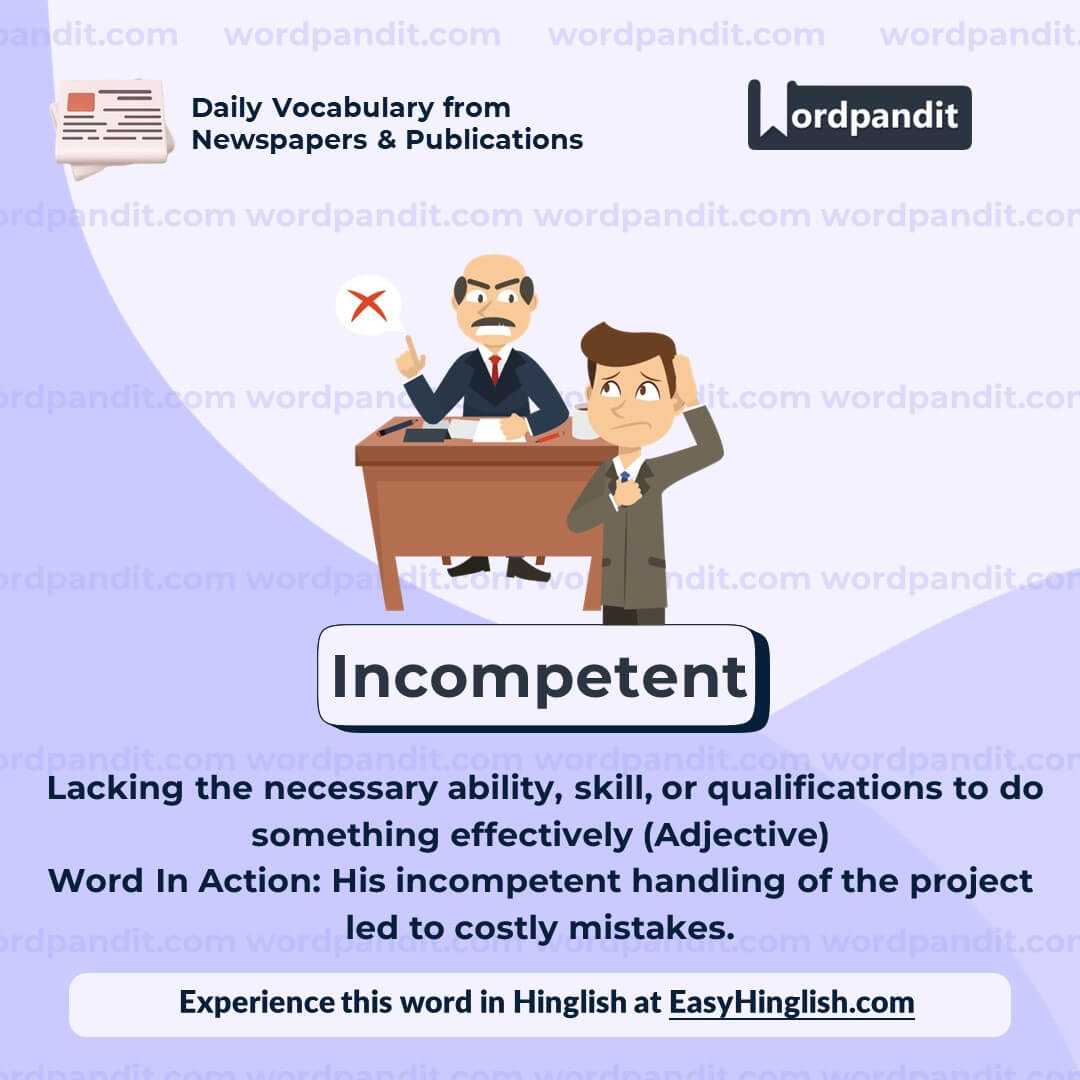Daily Vocabulary from Indian Newspapers and Publications
Welcome to Wordpandit’s Indian Vocabulary Hub
At Wordpandit, we understand the importance of staying rooted in the local context while expanding your language skills. This section focuses on enriching your vocabulary with words and phrases drawn from India’s leading newspapers and publications, ensuring you're learning vocabulary that is practical, relevant, and uniquely Indian.
Why Indian Sources Matter
We believe that the best way to master any language is by immersing yourself in local content. That’s why we carefully curate vocabulary from top Indian publications, including:
- The Hindu
- The Times of India
- The Economic Times
- Hindustan Times
- Live Mint
- The Indian Express
- And many others...
Stay Updated, Stay Relevant
With daily updates from Indian news sources, you’ll be consistently learning words that reflect the trends and shifts in Indian society and culture. Our focus is to provide vocabulary that enhances your understanding of the language in an Indian context.
How Wordpandit Supports Your Goals
Whether you’re preparing for exams, aiming to improve your professional communication, or simply want to stay connected with the latest Indian vocabulary, Wordpandit is here to guide you every step of the way.
Learn with a Practical Approach
Our interactive learning methodology includes real-world examples, engaging activities, and context-specific usage to ensure that every word becomes part of your active vocabulary.
Dive into Indian Vocabulary Today!
Why Choose Wordpandit?
Practical Learning: Focus on words you'll actually encounter in real-world reading, enhancing your comprehension and communication skills.
Diverse Content: From current affairs to scientific breakthroughs, our varied sources expose you to vocabulary across multiple domains.
Effortless Integration: Make Wordpandit a part of your daily routine. Just a few minutes each day can significantly boost your lexicon over time.
Your Path to Vocabulary Mastery
- Visit our Daily Vocabulary section regularly
- Explore new words and their usage in context
- Practice incorporating these words into your own writing and speech
- Track your progress as your vocabulary expands
Start Your Journey Today
Embark on your vocabulary enhancement journey with Wordpandit. By consistently engaging with our daily posts, you'll build a robust vocabulary that serves you well in academic, professional, and personal contexts.
Remember, a word a day keeps linguistic limitations at bay. Make Wordpandit your daily companion in the quest for vocabulary excellence!
WORD-1: Abdomen
Context:
"The officer said that Wagay suffered injuries in the abdomen and his wife and her sister’s daughter were hit in the legs." - The Wire
Explanatory Paragraph:
The abdomen is the part of the body located between the chest and the pelvis. It houses vital organs such as the stomach, intestines, liver, and kidneys. In medical and anatomical terms, injuries or pain in this region can be serious, as they may affect these essential organs.
Meaning: The part of the body between the chest and pelvis, containing digestive and other organs (Noun)
Pronunciation: AB-duh-muhn
Difficulty Level: ⭐⭐ Beginner
Etymology: Derived from Latin "abdōmen," meaning "belly" or "stomach," first used in English in the late 16th century.
Synonyms & Antonyms:
Synonyms: Belly, stomach, midsection, torso
Antonyms: Back
Usage Examples:
- After the accident, he complained of severe pain in his abdomen.
- Core exercises help strengthen the muscles in the abdomen.
- The doctor pressed on her abdomen to check for any swelling or tenderness.
- Insects have a segmented body structure that includes a distinct abdomen.
Cultural Reference:
"Many martial arts, such as karate, emphasize strengthening the abdomen to improve balance and power." - Fitness Experts
Think About It:
Why do you think the abdomen is often referred to as the "core" of the body? How does this relate to physical health?
Quick Activity:
Look up three different exercises that specifically target the abdomen. Try one and note how it affects your core muscles.
Memory Tip:
Think of "ab" in "abdomen" as the "abs" people work out at the gym—it’s the same body region!
Real-World Application:
The word "abdomen" is frequently used in medical reports, fitness discussions, and even insect biology. Understanding its meaning can help in various fields, from health to science.
WORD-2: Succumbed
Context:
"The victims were taken to hospital where Wagay succumbed to injuries while his wife and the girl are stable,” the officer said, without divulging more details." - The Wire
Explanatory Paragraph:
The word "succumbed" is used when someone gives in to a force that they cannot resist, often referring to death or illness. In the given context, it means that Wagay could not survive his injuries and passed away. More generally, "succumb" can also mean yielding to pressure, temptation, or overwhelming circumstances.
Meaning: To give in or fail to resist, often leading to death or defeat (Verb)
Pronunciation: suh-KUHMD
Difficulty Level: ⭐⭐⭐ Intermediate
Etymology: From Latin "succumbere," meaning "to lie down, submit," formed by "sub-" (under) + "cumbere" (to lie down). First used in English in the late 15th century.
Synonyms & Antonyms:
Synonyms: Yielded, surrendered, perished, gave in
Antonyms: Withstood, resisted, overcame, survived
Usage Examples:
- Despite a long battle with illness, he eventually succumbed to his condition.
- The city succumbed to the invading army after weeks of resistance.
- She tried to resist the temptation of chocolate but ultimately succumbed to her cravings.
- Many businesses succumbed to the economic downturn and had to shut down.
Cultural Reference:
"In Shakespeare’s tragedies, many protagonists succumb to their flaws or fate, leading to their downfall." - Literature Scholars
Think About It:
Why do you think people sometimes succumb to pressure, even when they know it may not be in their best interest?
Quick Activity:
Write a short paragraph using "succumbed" in a non-death-related context. For example, describe a time when you succumbed to temptation or pressure.
Memory Tip:
Think of "succumb" as "submitting" or "sinking under" something too strong to resist.
Real-World Application:
Understanding "succumbed" is useful in news reports, medical discussions, and literature. It helps describe outcomes where resistance was not enough.
WORD-3: Cordon
Context:
"Following the incident, a spontaneous shutdown was observed in the area while a massive cordon and search operation was launched by security forces to hunt down the attackers which was underway when this report was filed." - The Wire
Explanatory Paragraph:
The word "cordon" refers to a protective or restrictive barrier placed around an area to prevent movement in or out. It is commonly used in military, police, or emergency situations where authorities restrict access to a location for security reasons. In the given context, security forces established a "cordon" to isolate the area and conduct a search operation.
Meaning: A line or barrier set up to restrict access to or from an area (Noun); To surround or block off an area (Verb)
Pronunciation: KOR-duhn
Difficulty Level: ⭐⭐⭐ Intermediate
Etymology: From French "cordon," meaning "ribbon or cord," derived from Latin "chorda," meaning "rope or string." The term was first used in English in the 18th century to refer to military blockades.
Synonyms & Antonyms:
Synonyms: Barrier, blockade, perimeter, enclosure
Antonyms: Opening, access, passage
Usage Examples:
- The police set up a cordon around the crime scene to keep onlookers away.
- Authorities cordoned off the area due to the gas leak.
- A cordon of soldiers protected the entrance to the embassy.
- During the pandemic, a cordon sanitaire was established to contain the virus.
Cultural Reference:
"Cordon bleu," a famous French culinary term, originally referred to the blue ribbon worn by elite knights, signifying excellence." - French Cuisine
Think About It:
How do security cordons help maintain order, and when might they be considered excessive or restrictive?
Quick Activity:
Imagine you are a journalist reporting on an event where a security cordon has been set up. Write a short news headline using the word "cordon."
Memory Tip:
Think of a "cord" as a rope creating a barrier—just like a "cordon" that blocks access to an area.
Real-World Application:
"Cordon" is commonly used in news reports, military operations, and emergency situations. Understanding its meaning is useful for interpreting security-related events.
WORD-4: Scupper
Context:
"Returning to war would also scupper any short-term chance of a deal between Israel and Saudi Arabia — a major international achievement that Netanyahu has long coveted." - Telegraph India
Explanatory Paragraph:
The word "scupper" means to ruin, destroy, or prevent something from happening, usually a plan or an opportunity. In the given context, it suggests that renewed conflict would eliminate any possibility of an Israel-Saudi Arabia deal. Originally a nautical term referring to draining water from a ship, "scupper" is now commonly used in politics, business, and negotiations to describe sabotaging or thwarting something.
Meaning: To prevent, ruin, or destroy a plan or opportunity (Verb)
Pronunciation: SKUH-puhr
Difficulty Level: ⭐⭐⭐ Intermediate
Etymology: Originally a nautical term from the late 16th century, referring to holes in a ship’s side to drain water. Later, it evolved to mean "sink" or "ruin."
Synonyms & Antonyms:
Synonyms: Thwart, sabotage, derail, ruin, foil
Antonyms: Facilitate, assist, support, enable
Usage Examples:
- The sudden resignation of the CEO scuppered the company's expansion plans.
- Bad weather scuppered their outdoor wedding ceremony.
- The team’s poor defense scuppered their chances of winning the championship.
- His careless remark scuppered the negotiations before they even began.
Cultural Reference:
"Scuppering a deal is a common tactic in politics, where opponents deliberately create obstacles to prevent their rivals from succeeding." - Political Analysts
Think About It:
Have you ever had a plan that was scuppered at the last moment? What could you have done differently?
Quick Activity:
Write a sentence using "scupper" to describe an unexpected setback in your daily life.
Memory Tip:
Think of a ship sinking ("scuppered")—just like how a plan or opportunity can be completely ruined.
Real-World Application:
"Scupper" is frequently used in business, politics, and sports to describe major setbacks. Understanding this word can help you interpret news headlines and strategic decisions more effectively.
WORD-5: Incompetent
Context:
"But Israeli leaders see the authority as corrupt and incompetent and have dismissed the idea of giving it a major role in Gaza, at least for now." - Telegraph India
Explanatory Paragraph:
The word "incompetent" describes someone who lacks the ability, skill, or knowledge to perform a task effectively. It is often used to criticize leaders, professionals, or organizations that fail to meet expectations. In the given context, the Israeli leaders believe that the authority is unfit or incapable of managing Gaza properly, leading them to reject its involvement.
Meaning: Lacking the necessary ability, skill, or qualifications to do something effectively (Adjective)
Pronunciation: in-KOM-puh-tuhnt
Difficulty Level: ⭐⭐⭐ Intermediate
Etymology: From Latin "in-" (not) + "competentem" (suitable, capable), first used in English in the 17th century.
Synonyms & Antonyms:
Synonyms: Unskilled, unqualified, ineffective, incapable
Antonyms: Competent, skilled, capable, proficient
Usage Examples:
- The project failed due to incompetent management.
- His incompetent handling of finances led to the company’s downfall.
- The new policy was rushed and implemented in an incompetent manner.
- Hiring incompetent staff can severely damage a company’s reputation.
Cultural Reference:
"In many satirical TV shows and movies, government officials are often portrayed as incompetent bureaucrats who make foolish decisions." - Media Critics
Think About It:
Can incompetence be improved with training and experience, or is it an inherent trait?
Quick Activity:
Think of a famous historical or fictional character who was labeled incompetent. Write a short explanation of why they were seen this way.
Memory Tip:
Break it down: "In-" (not) + "competent" (capable) = not capable.
Real-World Application:
The word "incompetent" is widely used in workplace evaluations, political discussions, and news reports. Recognizing it can help you assess leadership, governance, and professional performance more critically.

















